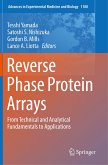Biomedical Translational Research
Drug Design and Discovery
Herausgegeben:Sobti, R.C.; Dhalla, Naranjan S.
Biomedical Translational Research
Drug Design and Discovery
Herausgegeben:Sobti, R.C.; Dhalla, Naranjan S.
- Broschiertes Buch
- Merkliste
- Auf die Merkliste
- Bewerten Bewerten
- Teilen
- Produkt teilen
- Produkterinnerung
- Produkterinnerung
This book, which is the third volume of Biomedical translational research, focuses on the fundamental role of biomedical research in developing new medicinal products. It emphasizes the importance of understanding biological and pathophysiological mechanisms underlying the disease to discover and develop new biological agents. The book uniquely explores the genomic computational integrative approach for drug repositioning. Further, it discusses the health benefits of nutraceuticals and their application in human diseases. Further, the book comprehensively reviews different computational…mehr
Andere Kunden interessierten sich auch für
![Biomedical Translational Research Biomedical Translational Research]() Biomedical Translational Research148,99 €
Biomedical Translational Research148,99 €![Biomedical Translational Research Biomedical Translational Research]() Biomedical Translational Research147,99 €
Biomedical Translational Research147,99 €![Biomedical Translational Research Biomedical Translational Research]() Biomedical Translational Research147,99 €
Biomedical Translational Research147,99 €![Reverse Phase Protein Arrays Reverse Phase Protein Arrays]() Reverse Phase Protein Arrays74,99 €
Reverse Phase Protein Arrays74,99 €![Reverse Phase Protein Arrays Reverse Phase Protein Arrays]() Reverse Phase Protein Arrays74,99 €
Reverse Phase Protein Arrays74,99 €![Biomedical Translational Research Biomedical Translational Research]() Biomedical Translational Research147,99 €
Biomedical Translational Research147,99 €![Biomedical Translational Research Biomedical Translational Research]() Biomedical Translational Research147,99 €
Biomedical Translational Research147,99 €-
-
-
This book, which is the third volume of Biomedical translational research, focuses on the fundamental role of biomedical research in developing new medicinal products. It emphasizes the importance of understanding biological and pathophysiological mechanisms underlying the disease to discover and develop new biological agents. The book uniquely explores the genomic computational integrative approach for drug repositioning. Further, it discusses the health benefits of nutraceuticals and their application in human diseases. Further, the book comprehensively reviews different computational approaches that employ GWAS data to guide drug repositioning. Finally, it summarizes the major challenges in drug development and the strategies for the rational design of the next generation more effective but less toxic therapeutic agents.
Produktdetails
- Produktdetails
- Verlag: Springer / Springer Nature Singapore / Springer, Berlin
- Artikelnr. des Verlages: 978-981-16-9234-5
- 1st ed. 2022
- Seitenzahl: 612
- Erscheinungstermin: 29. Juli 2023
- Englisch
- Abmessung: 235mm x 155mm x 33mm
- Gewicht: 926g
- ISBN-13: 9789811692345
- ISBN-10: 9811692343
- Artikelnr.: 68357590
- Verlag: Springer / Springer Nature Singapore / Springer, Berlin
- Artikelnr. des Verlages: 978-981-16-9234-5
- 1st ed. 2022
- Seitenzahl: 612
- Erscheinungstermin: 29. Juli 2023
- Englisch
- Abmessung: 235mm x 155mm x 33mm
- Gewicht: 926g
- ISBN-13: 9789811692345
- ISBN-10: 9811692343
- Artikelnr.: 68357590
Professor Ranbir Chander Sobti is an Emeritus Professor and Indian National Science Academy (INSA) senior scientist at Punjab University. He is a former Vice-Chancellor of the Panjab University, Chandigarh & Babasaheb Bhimrao Ambedkar University (Central University), Lucknow. He started his career as a cytogeneticist and then moved on to molecular biology, including genomics, to understand the susceptibility and disease process of cancer, COPD, AIDS metabolic syndrome, and kidney diseases. He has also used stem cells and nanoparticles to understand the process of tissue organ development through a designed de-cellularization protocol. He has published more than 300 research articles in the journals of international repute and has also published more than 40 books. He is a Fellow of the Third World Academy of Sciences, National Academy of Sciences India, Indian National Science Academy, National Academy of Medical Sciences, National Academy of Agricultural Sciences, Canadian Academy of Cardiovascular Diseases and few others. He was the General President of the Indian Science Congress for the 102nd session held at the University of Jammu in 2013. Dr. Sobti is the recipient of many prestigious awards like the INSA Young Scientist Medal, UGC Career Award, Punjab Rattan Award, JC Bose Oration and Sriram Oration Awards and of Life Time Achievement Awards of the Punjab Academy of Sciences, Zoological Society of India, and the Environment Academy of India. Dr. Naranjan S. Dhalla is a principal Investigator Experimental Cardiology, Institute of Cardiovascular Sciences Distinguished Professor, Max Rady College of Medicine Professor of Physiology and Pathophysiology, University of Manitoba Senior Fellow, Centre for the Advancement of Medicine Dr. Naranjan S. Dhalla has received more than 170 honours and awards from all over the world. These include the Order of Canada, Order of Manitoba, Order of the Buffalo Hunt from the Province of Manitoba, Fellowship in the Royal Society of Canada, Medal of Honour of the Canadian Medical Association, Research Achievement Award of the Canadian Cardiovascular Society, Chair in Cardiovascular Research and Honorary Professorship at different Universities. Dr. Dhalla was elected 2nd Greatest Manitoban of All Time and was featured in ¿Greatest Manitobans¿, a book published by the Winnipeg Free Press. Dr Dhalla has published large number of research papers and book Chapters. He has travelled widely and has addressed various national and international conferences.
Chapter 1. Emerging Technologies : Gateway to Understand Molecular Insight of Diseases, Newer Drugs, Their Design and Targeting.- Chapter 2. Polypharmacology: New Paradigms in Drug Development.- Chapter 3. Drug Repurposing in Biomedical Research : Benefits and Challenges.- Chapter 4. Computational Methods for Drug Repurposing.- Chapter 5. Genomic Approaches for Drug Repositioning.- Chapter 6. Organ-On-A- Chip: Novel in-Vitro Model For Drug Discovery.- Chapter 7. Precision Radiomolecular Oncology: Challenging the Classical Statistical Evidence Based Medicine.- Chapter 8. Drug Repositioning of the Phenylpiperazine Derivative Naftopidil in Prostate Cancer Treatment.- Chapter 9. Biomarker Based Drug Discovery and Reverse Translational Approach.- Chapter 10. Nanotechnology in Dentistry.- Chapter 11. Nanoparticles a Potential Breakthrough in Counteracting Multidrug-Resistant Bacterial Infections: A Holistic View on Underlying Mechanisms and Antibacterial Properties.- Chapter 12. Emerging Role of Cannabinoid System Modulators in Treatment of Cancer.- Chapter 13. Nanodrugs : A Futuristic Approach for Treating Nephrolithiasis.- Chapter 14. Lipo Dermaceuticals : Technological Transformation.- Chapter 15. The Importance of Drug Dose Adjustment in Elderly Patients with Special Considerations for Patients on Diverse Co-Medications and Antidepressants.- Chapter 16. Role of Microfluidics and Nano Fluidics in Managing CAD.- Chapter 17. Targeted Gene Delivery Through Magnetofection: The New Face of Medicine.- Chapter 18. Qbd-Steered Systematic Development of Drug Delivery Nanoconstructs : Vital Precepts, Retrospect and Prospects.- Chapter 19. Nanoemulsions: A Potential Advanced Nanocarrier Platform for Herbal Drug Delivery.- Chapter 20. Sirna Encapsulated Nanoparticles for Targeting Dorsal Root Ganglion (Drg) in Diabetic Neuropathic Pain.- Chapter 21. EGFR Targeted Quinazoline Clubbed Heterocycles as Anti-Cancer Agents. Chapter 22. Therapeutic Human Monoclonal Antibodies.- Chapter 23. Hydroxyapatites and Their Biomedical Applications.- Chapter 24. Recent Progress in Applications of Magnetic Nanoparticles in Medicine: A Review.- Chapter 25. Chimeric Antigen Receptor T-Cell Therapy: A Cutting Edge Therapy for Multiple Myeloma.- Chapter 26. Nanoparticles-Associated Lipopeptides: A New Class of Antimicrobials.- Chapter 27. Antimicrobial Applications of Engineered Metal-Based Nanomaterials.- Chapter 28. Strengthening Immunity-Ayurveda & Medicinal Plants.- Chapter 29. The Pathophysiology of Liver Disorders and Pharmacotherapy Options with Special Reference to Traditional Herbal Medicines: A Comprehensive Review.- Chapter 30. Polymeric Vehicles for Controlled Delivery of Ayurvedic Drugs for Wound Management.
Chapter 1. Emerging Technologies : Gateway to Understand Molecular Insight of Diseases, Newer Drugs, Their Design and Targeting.- Chapter 2. Polypharmacology: New Paradigms in Drug Development.- Chapter 3. Drug Repurposing in Biomedical Research : Benefits and Challenges.- Chapter 4. Computational Methods for Drug Repurposing.- Chapter 5. Genomic Approaches for Drug Repositioning.- Chapter 6. Organ-On-A- Chip: Novel in-Vitro Model For Drug Discovery.- Chapter 7. Precision Radiomolecular Oncology: Challenging the Classical Statistical Evidence Based Medicine.- Chapter 8. Drug Repositioning of the Phenylpiperazine Derivative Naftopidil in Prostate Cancer Treatment.- Chapter 9. Biomarker Based Drug Discovery and Reverse Translational Approach.- Chapter 10. Nanotechnology in Dentistry.- Chapter 11. Nanoparticles a Potential Breakthrough in Counteracting Multidrug-Resistant Bacterial Infections: A Holistic View on Underlying Mechanisms and Antibacterial Properties.- Chapter 12. Emerging Role of Cannabinoid System Modulators in Treatment of Cancer.- Chapter 13. Nanodrugs : A Futuristic Approach for Treating Nephrolithiasis.- Chapter 14. Lipo Dermaceuticals : Technological Transformation.- Chapter 15. The Importance of Drug Dose Adjustment in Elderly Patients with Special Considerations for Patients on Diverse Co-Medications and Antidepressants.- Chapter 16. Role of Microfluidics and Nano Fluidics in Managing CAD.- Chapter 17. Targeted Gene Delivery Through Magnetofection: The New Face of Medicine.- Chapter 18. Qbd-Steered Systematic Development of Drug Delivery Nanoconstructs : Vital Precepts, Retrospect and Prospects.- Chapter 19. Nanoemulsions: A Potential Advanced Nanocarrier Platform for Herbal Drug Delivery.- Chapter 20. Sirna Encapsulated Nanoparticles for Targeting Dorsal Root Ganglion (Drg) in Diabetic Neuropathic Pain.- Chapter 21. EGFR Targeted Quinazoline Clubbed Heterocycles as Anti-Cancer Agents. Chapter 22. Therapeutic Human Monoclonal Antibodies.- Chapter 23. Hydroxyapatites and Their Biomedical Applications.- Chapter 24. Recent Progress in Applications of Magnetic Nanoparticles in Medicine: A Review.- Chapter 25. Chimeric Antigen Receptor T-Cell Therapy: A Cutting Edge Therapy for Multiple Myeloma.- Chapter 26. Nanoparticles-Associated Lipopeptides: A New Class of Antimicrobials.- Chapter 27. Antimicrobial Applications of Engineered Metal-Based Nanomaterials.- Chapter 28. Strengthening Immunity-Ayurveda & Medicinal Plants.- Chapter 29. The Pathophysiology of Liver Disorders and Pharmacotherapy Options with Special Reference to Traditional Herbal Medicines: A Comprehensive Review.- Chapter 30. Polymeric Vehicles for Controlled Delivery of Ayurvedic Drugs for Wound Management.








